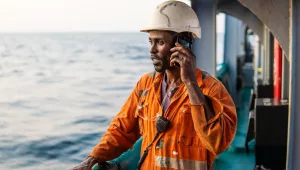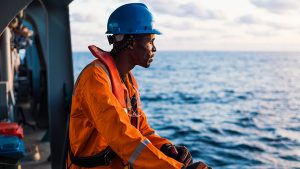Impact of Digital Connectivity on Seafarer Mental Health
Container ships or oil tankers usually have a crew numbering between 18 to 24 persons. Mostly they don’t know each other, are from different nationalities and remain occupied at their work stations.In today’s world technology has brought about tremendous changes in the way we communicate . With the advent of digital connectivity people have become more connected than ever before, regardless of their geographical locations. This has significantly impacted various sectors including the maritime industry.
 Credit NAUTILUS INTERNATIONAL
Credit NAUTILUS INTERNATIONAL
Seafarers, including navy workers and military personnel, are often at sea for months at a time and that to under a strict regimen. This separation from family and friends can lead to feelings of loneliness, isolation and even depression. However, with the emergence of digital connectivity there is a potential for these symptoms to be conveniently alleviated.
 Credit Marine Insight
Credit Marine Insight
Women Seafarers Vulnerability and Digitalisation
There is a perception that such issues discourage women from entering the maritime sector.Seafaring has traditionally been a male domain. There is an impression that women lack family support, awareness of seafaring as a profession is not imparted in college and there are few female role models in the field. However in the Western countries ,Latin America and even India women are entering the profession in greater numbers.Women are generally emotionally attached to their family and thus more psychologically vulnerable if they remain away for longer periods.
 Credit SEAMAN MEMORIES
Credit SEAMAN MEMORIES
The pandemic saw seafarers being away from their families for extended periods. One of the most significant ways digital connectivity can help seafarers is by providing them with a means to communicate with their families and friends while at sea. Modern communication tools like video calling , messaging applications , satellite based internet facilities in the middle of the ocean and social media platforms virtually enable seafarers to stay connected with family and friends. This mitigates pangs of isolation, loneliness and improves mental health.
 Credit The Mission to Seafarers
Credit The Mission to Seafarers
Studies on Seafarers Mental Health
Emerging research shows that digital connectivity can help seafarers maintain their mental wellbeing through constant connectivity with their loved ones. Acute instances of loneliness can be managed as access to professional help and counselling is readily available.
A study published in the International Maritime Health Journal in 2020 established that seafarers who had access to digital communication such as internet manifested lower rates of depression and anxiety than those seafarers deprived of digital connectivity. A similar study by the International Transport Workers’ Federation in 2019 revealed seafarers who had access to internet and social media platforms were less likely to develop feelings of isolation and that their overall wellbeing was good which resulted in consistent productivity. Job interviews can be conducted while at sea.
In addition to keeping in touch with loved ones digital connectivity can also provide seafarers with access to mental health support services. In a survey conducted by the Mission to Seafarers in 2020 around 75 % of seafarers were inclined to utilise mental health applications and 51 % indicated their willingness to seek consultation through telemedicine. Marine logistic and shipping companies are embracing the role of digital connectivity in supporting the mental health of their employees. The Maersk Group has implemented a telemedicine service that provides seafarers with 24/7 access to mental health professionals and counsellors while at sea. Similarly the Sailors’ Society has launched an application that provides seafarers with mental health support including counseling services and self-help tools. Online counseling services and mental health applications are now readily available which can help seafarers manage their stress levels and address any mental health issues they may be experiencing.
 Credit Lloyd’s List
Credit Lloyd’s List
However a word of caution that digital connectivity is not a complete solution to complexity of seafarer mental health and limitations are there as to what extent such issues can be handled at sea. Digital connectivity can in no way or manner be a substitute for physical presence yet digital connectivity has contributed towards improving the mental health of seafarers .
Author Misbah Zahoor

I found it really interesting. Your analysis of the benefits of digital connectivity, like having more support from friends and family and being able to have access to mental health resources online is impressive.
I found it really interesting. Your analysis of the benefits of digital connectivity, like having more support from friends and family and being able to have access to mental health resources online is impressive.
Really Impressive.
Interesting and well-researched article. Keep it up!
✌🏻
Well written…….. keep it up👍
Great work!
I am curious to know – How the idea came into your mind to write about seafarers
&
Does digital non connectivity have some positive effects on the digital seafarer as well 🤔